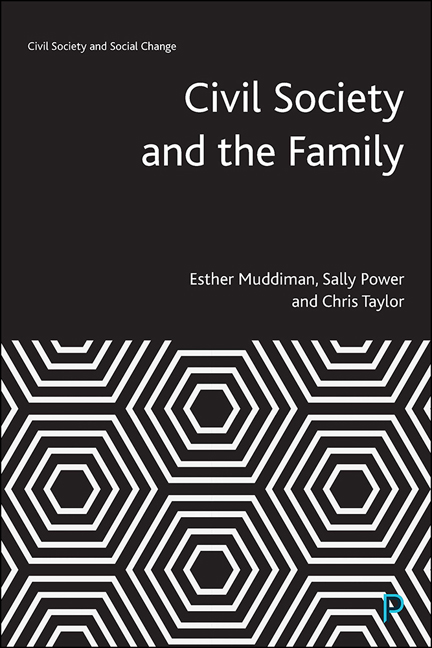Book contents
- Frontmatter
- Contents
- Tables
- Figures
- Notes on the Authors
- Acknowledgements
- 1 Starting Points
- 2 The Paradoxical Positioning of the Family and Civil Society
- 3 The Challenges of Researching the ‘Private Sphere’ of the Family
- 4 The Uncertain Business of Raising Citizens
- 5 Keeping the Faith? Secularisation, the Family and Civic Engagement
- 6 Mothers, Grandmothers and Civic Engagement
- 7 Family Arguments: Finding one’s Voice
- 8 Politicising Family Food Practices
- 9 The Upward Transmission of Civic ‘Virtues’
- 10 Reframing Civil Society and the Family
- References
- Index
5 - Keeping the Faith? Secularisation, the Family and Civic Engagement
Published online by Cambridge University Press: 18 March 2021
- Frontmatter
- Contents
- Tables
- Figures
- Notes on the Authors
- Acknowledgements
- 1 Starting Points
- 2 The Paradoxical Positioning of the Family and Civil Society
- 3 The Challenges of Researching the ‘Private Sphere’ of the Family
- 4 The Uncertain Business of Raising Citizens
- 5 Keeping the Faith? Secularisation, the Family and Civic Engagement
- 6 Mothers, Grandmothers and Civic Engagement
- 7 Family Arguments: Finding one’s Voice
- 8 Politicising Family Food Practices
- 9 The Upward Transmission of Civic ‘Virtues’
- 10 Reframing Civil Society and the Family
- References
- Index
Summary
Introduction
This chapter explores the apparently increasingly precarious connections between religion, the family and civil society. We have devoted this chapter to exploring these connections for a number of interrelated reasons: first, religious affiliation is closely associated with civic engagement; second, religious affiliation has traditionally been passed down within families; and, third, the increasing secularisation of society appears to be weakening the capacity of families to pass on their religious beliefs and practices, which is likely to have important implications for civil society.
In this chapter, we draw on survey data from our youngest participants and their parents, as well as on the qualitative accounts of parents and grandparents (with reference to parents’ family tree maps), to explore how these developments are being played out within our participating families. We address four key questions in turn:
To what extent is it clear that religion acts as a conduit between families and civil society?
What is it about religious affiliation that fosters civic engagement?
How successful – or otherwise – have families been in ‘passing down’ their faith to younger generations?
What are the implications of increasing secularisation for their civic engagement?
While the process of secularisation has been clearly evident across all ‘Western’ societies (Bruce, 2011; Crockett and Voas, 2006; Voas and Chaves, 2016), it appears to have been particularly marked in Wales. Traditionally, religion has been far more significant in Wales than in other parts of Britain. Indeed, over a hundred years ago, Wales experienced what is now referred to as the ‘Welsh Revival’: a dramatic Nonconformist religious movement that spread across the country in a matter of months during 1904–05 (see Williams, 1952). Although the Revival was relatively short-lived, its influence on Welsh life was significant through the first half of the 20th century. In addition to keeping ‘the churches of Wales filled for many years to come’ (Orr, 1973), it had strong implications for civil society through putting ‘the chapel back in the van of reformist movements’ (Williams, 1952: 258). However, during the second half of the 20th century, religious affiliation declined rapidly, leading to what Chambers and Thompson (2005: 29) describe as the ‘progressive collapse of the public hegemonic status of Christianity in Welsh society’.
- Type
- Chapter
- Information
- Civil Society and the Family , pp. 75 - 98Publisher: Bristol University PressPrint publication year: 2020



